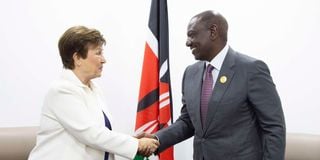Latest IMF prescription for Kenya kicks up storm

President William Ruto meets with IMF Managing Director Kristalina Georgieva on the sidelines of COP27 in Sharma El-Sheikh, Egypt.
As chair of the Presidential Council of Economic Advisers, what Dr David Ndii says not only counts but matters.
It did not surprise that a tweet in which he appeared to counter a pronouncement by the Chief Executive of the International Monetary Fund (IMF), Kristalina Georgieva, made after holding discussions with President William Ruto and a team of his economic advisers at State House last week, ignited a raging debate.
What the visiting IMF chief said can be summarised as follows: “Your domestic market for government securities is not doing well because you are not accepting higher interest rates on bonds at the auctions.” And then her prescription: “Start allowing interest rates on securities to go up to make the paper more attractive to domestic investors.”
Ndii’s response was terse: “Really? Could the Fund be oblivious to the market-to-market mayhem that has taken down four US banks already? Why would banks buy more bonds when their entire trading portfolios are underwater? What I’m I missing?”
Coming from no less authority than Ruto’s chief economic adviser, pundits were left scratching their heads and pondering the implications to Kenya’s diplomatic relations with the Fund. Is Kenya considering breaking ranks with the IMF over some of the onerous strings the lenders have attached to offering the country financial help?
Or was Ndii’s just a tactical ploy – a floating trial balloon to generate public debate on IMF conditionalities and prepare the public to accept the inevitability of the lender’s bitter pill?
Here, a brief background of the market-to-market mayhem in the US that Ndii was referring to in his tweet. For many years, interest rates in the country were near zero as the Fed flooded the market with easy money in a policy known as quantitative easing.
To respond to recent stresses on the supply side, especially the war in Ukraine, the US Fed and central banks around the world commenced very aggressive rate hikes to tame inflation.
The unintended consequence of these rate hikes was the value of treasury bonds that banks were holding lost massive value when they were now revalued to reflect the new realities of a high-interest rate regime. As a result, banks experienced massive outflows of depositors that saw the Silicon Valley Bank collapse. The same phenomena crashed Credit Suisse which had to be taken over by UBS.
Thus, Ndii’s point is that if Kenya adopted the IMF prescription of allowing interest rates to go up, the country would be risking the same mayhem the US was experiencing.
In addition, if Kenya was to follow the IMF prescription to increase rates, total debt service costs which are already sky-high at 65 per cent of revenue will rise significantly and go beyond the country’s ability to pay. Ndii’s tweet was alert to the burden that high-interest rates the IMF was demanding were bound to impose on the taxpayer.
Devalue currency
Even though he did not mention it, yet another IMF prescription which the government is going to find politically hard to implement is the suggestion by the lender that Kenya should devalue its currency by allowing the shilling to float to its market-determined value. Indeed, the immediate impact of any significant devaluation of the currency would lead to a substantial increase in external debt repayment costs.
With the country’s external debt cost already at 65 per cent of GDP, Kenya has no headroom or space of taking any significant increases in debt cost. Another key prescription in the IMF chief’s interview last week was for the government to increase taxation levels from the country's 17 per cent tax take to GDP to 25 per cent. Put simply, the Fund is asking Kenya to raise taxes by one and a half times.
Yet, justifying higher taxation in the country’s current political circumstances is a live wire because of the risk of aggravating social unrest. Already, the government has in recent weeks been grappling with noisy street protests mounted by the opposition on grounds of high consumer prices which – in part – was the consequence of the IMF’s imposed policy of removal of subsidies on fuel. Civil servants' trade unions have threatened strikes over wage freezes and frequent delays in the payment of salaries.
An innocent tweet by Ndii highlighted the need for the fund to reset its conditionalities for Kenya. The stakes for Kenya being in good books couldn’t be higher. In the first place, there is still US$800 million to be disbursed under the current program that was signed in April 2021. Furthermore, the IMF is dangling a further US$1 billion under a new and so-called Resilience and Sustainability Facility. Thus, the Fund continues to strategically maintain leverage over Kenya.
Send us your email on [email protected] for a free subscription to your favourite weekly magazine in a mobile-optimised digital format. The Weekly Review is also available for free to Nation e-paper subscribers.





